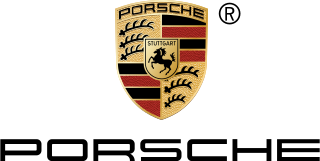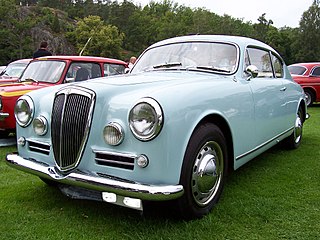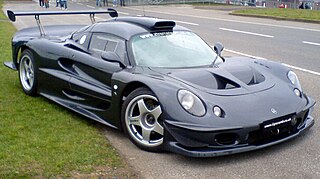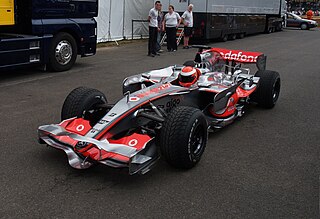Development
Following the 1996 BPR Global GT Series season, the FIA chose to promote the championship to a more international status and revamp the series into the FIA GT Championship. This was due to the increased amount of manufacturer support from the series, with makes including Mercedes-Benz, Porsche, Lotus, Panoz, and Chrysler. This increase in manufacturer input escalated the cost of being competitive in the series, driving various privateer teams out of the Championship.
Mercedes-Benz is a German global automobile marque and a division of Daimler AG. The brand is known for luxury vehicles, buses, coaches, and trucks. The headquarters is in Stuttgart, Baden-Württemberg. The name first appeared in 1926 under Daimler-Benz. In 2018, Mercedes-Benz was the biggest selling premium vehicle brand in the world, having sold 2.31 million passenger cars.

Dr.-Ing. h.c. F. Porsche AG, usually shortened to Porsche AG, is a German automobile manufacturer specializing in high-performance sports cars, SUVs and sedans. Porsche AG is headquartered in Stuttgart, and is owned by Volkswagen AG, which is itself majority-owned by Porsche Automobil Holding SE. Porsche's current lineup includes the 718 Boxster/Cayman, 911, Panamera, Macan and Cayenne.

Lotus Cars is a British automotive company that manufactures sports cars and racing cars in its headquarters in Hethel, United Kingdom. Lotus cars include the Esprit, Elan, Europa, Elise, Exige and Evora sports cars and it had motor racing success with Team Lotus in Formula One. Lotus Cars are based at the former site of RAF Hethel, a World War II airfield in Norfolk. The company designs and builds race and production automobiles of light weight and fine handling characteristics. It also owns the engineering consultancy firm Lotus Engineering, which has facilities in the United Kingdom, United States, China, and Malaysia.
At the same time, the FIA began to shorten events in the schedule. While most races in 1997 remained at four hours as they had been during BPR, others were shortened to just three hours. This was further revamped in 1998 as all events, besides the Suzuka 1000km, were run for only 500 kilometers, averaging under three hours per race.
Believing that the FIA GT Championship was moving away from the BPR Global GT Series' ideals for grand tourer racing, the Peter Organisation chose to create a new championship in 1998 as an alternative to FIA GT. This series would return to some of the concepts of BPR, such as all events being four hours in length. The series would also have a ban on direct manufacturer input, leaving the series open to small private teams who could not easily compete in the high-cost FIA GT series.

A grand tourer (GT) is a car that is designed for high speed and long-distance driving, due to a combination of performance and luxury attributes. The most common format is a front-engine, rear-wheel-drive two-door coupé with either a two-seat or a 2+2 arrangement.
The new GTR Euroseries would also bring back some of the class structure that had been used in BPR. Besides allowing the GT1 and GT2 classes from FIA GT, the GT3 and GT4 classes also returned. These classes would be composed of cars from one-make series, such as the Porsche Supercup, Ferrari Challenge, or Venturi Trophy. Because these cars were much closer to their street legal counterparts, they were an even cheaper alternative to the GT1 and GT2 classes.
The Porsche Mobil 1 Supercup is the international motor racing series supporting the FIA Formula One World Championship organized by Porsche AG.
The Ferrari Challenge is a single-marque motorsport championship that was created in 1993 for owners of the 348 Berlinetta who wanted to become involved in racing. It now encompasses three official championships in the United States, Asia-Pacific, and Europe. Competitors from each series are brought together at the annual World Finals event. From 2007-10, the Ferrari Challenge exclusively used the Ferrari F430 model. 2011 saw the introduction of the 458 Challenge with the 458 Challenge Evoluzione following in 2014. In 2018 Ferrari introduced the 488 Challenge.

Venturi Automobiles is a French-founded Monegasque-based multinational automotive manufacturer that presently designs, manufactures, and sells luxury electric vehicles, although in the past petrol-powered sports/GT cars were also sold.
1998 season
The first round of the season in Jarama had twenty competitors appearing, with at least two cars in each class. The first race was easily won by a GT1 class competitor, Thomas Bscher, using a McLaren F1 GTR, a car which still competed in FIA GT Championship. However, the next round at Paul Ricard would not feature the McLaren, and instead the GT1 class was left with only a Porsche 911 GT2 Evo. GT2 class was the most prevalent, with nine competitors, while the GT4 class also had a variety of machines.

The McLaren F1 GTR was a racing variant of the McLaren F1 sports car first produced in 1995 for grand touring style racing, such as the BPR Global GT Series, FIA GT Championship, JGTC, and British GT Championship. It is most famous for its overall victory at the 1995 24 Hours of Le Mans where it won against faster purpose-built prototypes. The McLaren F1 GTR raced internationally until 2005 when the final race chassis was retired.

The Porsche 911 GT2 is a high-performance sports car built by the German manufacturer Porsche from 1993 to 1998, 2001 to 2005, 2007 to 2012, and then since 2018. It is based on the 911 Turbo, and uses a similar twin-turbocharged engine, but features numerous upgrades, including engine upgrades, larger brakes, and stiffer suspension calibration. The GT2 is significantly lighter than the Turbo due to its use of rear-wheel-drive instead of all-wheel-drive and the reduction or removal of interior components. As a result, the GT2 is the most expensive and fastest model among the 911 lineup with a 0-60 mph time of 2.7 seconds.
By the third round of the season, the series mostly became a competition with the GT2 and GT4 classes, of which most of the competitors used Porsches. A mere 12 entrants showed at Misano, while only ten arrived at the Nürburgring. The series saw some revival in its final round of the season at Spa-Francorchamps, as 19 cars were entered, but the field still consisted mostly of GT2 and GT4 teams.
During the 1998 season, the FIA GT Championship announced their plans to eliminate their GT1 class due to the high cost of the machines which ran it and the dominance of Mercedes-Benz in the Championship. This left only the smaller GT2 class, of which only Chrysler ran a factory squad. Believing the smaller FIA GT Championship would be more open to privateer teams in 1999 and due to a lack of competitors during the 1998 season, the GTR Euroseries was cancelled after five rounds due to a lack of teams entering and no desire to run a separate series in 1999.
Results
All races were four hours in length. The Misano Gold Cup allowed sports-prototypes to compete alongside the GT cars.
This page is based on this
Wikipedia article Text is available under the
CC BY-SA 4.0 license; additional terms may apply.
Images, videos and audio are available under their respective licenses.

The Porsche 911 GT1 is a car designed and developed by German automobile manufacturer Porsche AG to compete in the GT1 class of sports car racing, which also required a street legal version for homologation purposes. The limited-production street-legal version developed as a result was named the 911 GT1 Straßenversion.

The Lister Storm was a homologated racing car manufactured by British low volume automobile manufacturer by Lister Cars with production beginning in 1993. The Storm used the largest V12 engine fitted to a production road car since World War II, a 7.0 L Jaguar unit based on the one used in the Jaguar XJR-9 that competed at the 24 Hours of Le Mans. Due to the high price of the vehicle at £220,000, only four examples were produced before production of the road-going Storm ceased. Only three Storms survive today, although the company continues to maintain racing models. The storm was the fastest four-seat grand tourer during the 1990s and early 2000s.
The World Sportscar Championship was the world series run for sports car racing by the FIA from 1953 to 1992.
EMKA Racing was a British racing team founded in 1980 by Steve O'Rourke, manager of the band Pink Floyd. The team occasionally ran under the name of EMKA Productions, the name of O'Rourke's management company. The team's name comes from O'Rourke's two daughters, Emma and Katheryne. O'Rourke and EMKA concentrated on sports car racing with brief interludes into British Formula One until 1985 when the team was broken up before returning again in 1991. The team was finally dissolved in early 2004 following O'Rourke's death. The team had won the drivers championship for O'Rourke and Tim Sugden in the British GT Championship in 1997 and 1998.
The 1998 24 Hours of Le Mans was the 66th Grand Prix of Endurance, and took place on 6 and 7 June 1998.

The Mercedes-Benz CLK GTR (W297) is a sports car and race car produced by Mercedes-AMG, the performance and motorsports arm of Mercedes-Benz. Intended for racing in the new FIA GT Championship series in 1997, the CLK GTR was designed primarily as a race car, with the road cars necessary in order to meet homologation standards being secondary in the car's design. Thus the limited production of road-going cars are considered racing cars for the road.

The Lotus Elise GT1 is a race car developed for grand tourer-style sports car racing starting in 1997.
Throughout its long history, Mercedes-Benz has been involved in a range of motorsport activities, including sportscar racing and rallying, and is currently active in Formula Three, Formula E and Formula One.

The Panoz Esperante GTR-1 was a race car developed by Panoz Auto Development and Reynard Motorsport for grand tourer endurance racing in 1997. Although named after the Panoz Esperante roadster, the GTR-1 actually bore no mechanical relation to the production Esperante, instead sharing only minor styling points. Only two road-legal GTR-1s were built to meet homologation requirements set forth by the ruling bodies which the racing cars ran under.
The BMW V12 LM was a racing car built for sports car racing in 1998. The car was built using a combination of WilliamsF1 engineering and construction and a BMW powerplant. The car was a predecessor to the BMW V12 LMR which debuted in 1999.
The 1996 BPR International Endurance GT Series was the third season of BPR Global GT Series. It is a series for Grand Touring style cars broken into two classes based on power and manufacturer involvement, called GT1 and GT2. It began on 3 March 1996 and ended 3 November 1996 after 11 races. After the end of the season, two promotional races were held in Brazil, in the circuits of Curitiba and Brasília.

The Chrysler Viper GTS-R was a successful racing variant of the Dodge Viper developed in conjunction with Chrysler of North America, Oreca of France, and Reynard Motorsport of the United Kingdom. Officially unveiled at the 1995 Pebble Beach Concours, it has won numerous championships and famous events in its history. Some chassis are still in use today.

Chris Goodwin is a British auto racing driver. Currently he works as Expert High Performance Test Driver for Aston Martin. Additionally he manages the racing career of Bruno Senna and continues to race in International GT Endurance events.
Fabien Giroix is a French racing driver from Saint-Maur-des-Fossés, Paris.

Pekaracing NV competing as PK Carsport is a racing team currently competing in the NASCAR Whelen Euro Series, Belcar Trophy among other series. The team has previously competed in other series such as the FIA GT Championship.
RWS Motorsport is an auto racing team based in Anger, Bavaria, Germany. Founded in 1995 by former racing driver and engineer Rudi Walch, the team has been involved in multiple international series, primarily the FIA GT Championship. The team were the vice champions of the N-GT category of the FIA GT Championship in 2000 and 2001. Since 2003, RWS has concentrated on historic motorsport and vehicle restoration, repair, and sales.

Group GT1 also known simply as GT1, was a set of regulations maintained formerly by the Fédération Internationale de l'Automobile, for Grand Tourer racing. The category was first created in 1994, as the top class of the BPR Global GT Series, and was included in the 24 Hours of Le Mans. It fell under FIA regulation from 1997, after the BPR series came under the control of the FIA, becoming known as the FIA GT Championship. The category was dissolved at the end of 2011. The category may be split into 4 distinctive eras, from its debut in 1994-1996,1997-1998, 2000-2009, 2010-2011.
















